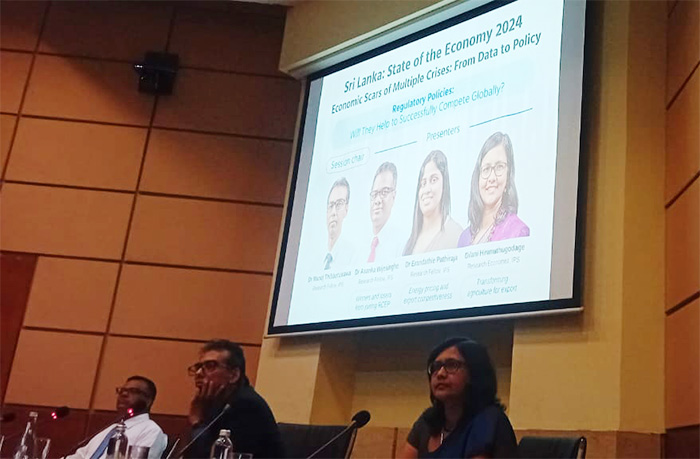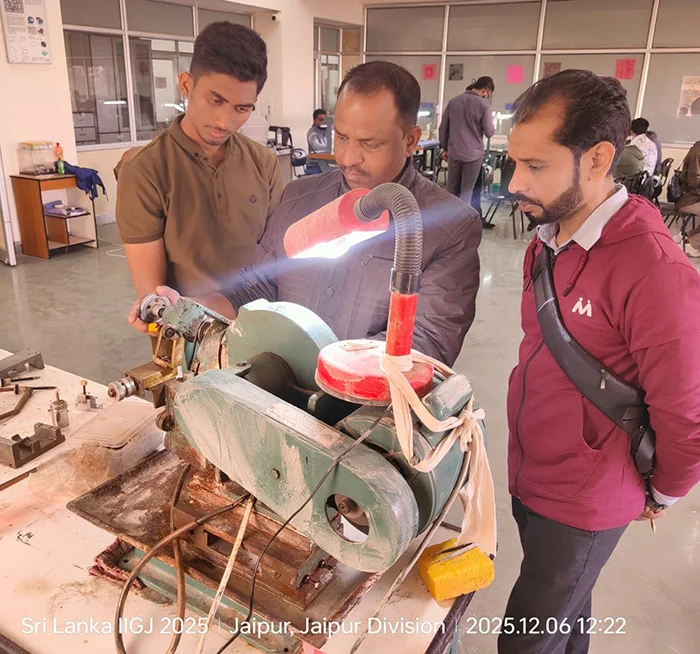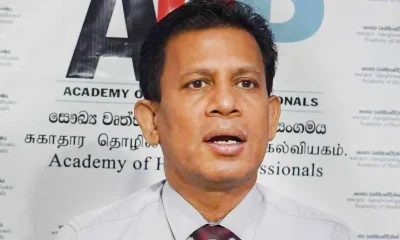Business
Regulatory policies seen as key to SL’s global competitiveness

By Ifham Nizam
As Sri Lanka tackles its economic recovery and development, regulatory policies across key sectors—trade, energy and agriculture—are set to play a pivotal role in determining the nation’s global competitiveness, Institute of Policy Studies, Research Fellow, Dr. Manoj Thibbotuwawa said.
Speaking on the topic `How Regulatory Policies Could Shape Global Competitiveness’ at a discussion held at the IPS recently in Colombo, he said, whether carefully crafted or poorly implemented, these policies could either accelerate Sri Lanka’s progress or leave it vulnerable to crises, as evidenced by the recent missteps in agricultural policy.
He also said that the fertilizer ban, implemented without proper preparation, caused havoc in the agricultural sector, resulting in two consecutive failed seasons.
Thibbotuwawa added that despite traditionally being self-sufficient in rice production, Sri Lanka was forced to import large quantities of rice, underlining the catastrophic consequences of poorly planned regulations. This experience highlights the importance of sound policymaking across sectors critical to the nation’s global economic standing.
Trade liberalization can be both an engine for growth and a source of economic strain. IPS, Research Fellow, Dr. Asanka Wijesinghe, who is an expert in economic integration, stressed that the complex implications of joining regional trade agreements, such as, the Regional Comprehensive Economic Partnership (RCEP).
He added that while liberalizing trade could stimulate Sri Lanka’s GDP growth and create jobs, it comes with significant challenges, such as, an increase in trade deficits with manufacturing giants like China and East Asian countries.
‘Sri Lanka faces the challenge of reorienting its economic focus toward export-led growth, he noted adding that domestic industries remain heavily protected, which inhibits the development of an export-oriented economy.
“To harness the full potential of trade agreements, policymakers must prioritize sectors where Sri Lanka holds a comparative advantage. However, this shift requires a delicate balance to manage short-term disruptions, including potential impacts on the labor market, he added.
High energy costs remain a stumbling block for Sri Lanka’s export competitiveness, said IPS, Research Fellow, Dr. Erandhatie Pathiraja, adding that energy pricing reform is vital for making Sri Lankan industries globally competitive. Sectors such as apparel and tea—key contributors to national export earnings—are particularly sensitive to energy costs, which erode profit margins and make it difficult to compete with lower-cost producers in the region.
She stressed that renewable energy presents a promising solution to this problem, with Sri Lanka already having committed to ambitious climate goals under its Nationally Determined Contributions (NDCs).
However, she said institutional bottlenecks and political roadblocks have delayed the adoption of renewable energy technologies. `For Sri Lanka to reduce its reliance on expensive fossil fuels and improve its global competitiveness, overcoming these barriers will be critical.’
Agriculture remains a cornerstone of Sri Lanka’s economy, contributing 8% of GDP and nearly 20% of export earnings, said IPS Research Economist Dilhani Hirimuthugodage.
Despite its importance, she said that the sector is burdened by structural issues such as land fragmentation, low mechanization, and outdated technology.
She stressed that as Dr.Thibbotuwawa highlighted, the recent fertilizer ban further exacerbated these challenges, resulting in significant losses for farmers and reduced yields.
However, she added that Sri Lanka’s agriculture sector holds untapped potential, particularly in export agriculture. Spices, for example, represent a key area where Sri Lanka has a strong competitive advantage on the global stage.
“To capitalize on this potential, the government must invest in modernizing agricultural practices, improving supply chains, and accessing new markets. By doing so, Sri Lanka can diversify its export portfolio and boost overall economic growth, she stressed.
In closing remarks, Dr. Thibbotuwawa said the road ahead for Sri Lanka involves not just reforming individual sectors but adopting a holistic, integrated approach to economic development. Policymakers must recognize the interconnectedness of trade, energy, and agriculture and create regulatory frameworks that enable each sector to thrive in the global marketplace.
Business
Real economic data isn’t in a report: It’s on a bargain table

If you want to understand Sri Lanka’s economy, don’t start with reports from the Ministry of Finance or the Central Bank. Go instead to a crowded clothing sale on the outskirts of Colombo.
In places like Nugegoda, Nawala, and Maharagama, temporary year-end sales have sprung up everywhere. They draw large crowds – not just bargain hunters, but families carefully planning every rupee. People arrive with SMS alerts on their phones and fixed budgets in their minds. This is not casual shopping. It is a public display of resilience, a tableau of how people are coping.
Tables are set up in parking lots and open halls, clothes spilling from cardboard boxes. When new stock arrives, hands reach in immediately – young and old, men and women – searching for the right size, the least faded colour, the smallest flaw that justifies the price. Everyone is heard negotiating, not with desperation, but with a quiet, shared dignity.
“Look at the prices in the malls, then look here,” says a middle-aged mother shopping for school uniforms in Maharagama. “This isn’t shopping for enjoyment. This is about managing life.” Food prices have already stretched her household budget thin. Here, she can buy trousers for half the usual price.
Women, often the household’s purchasing managers, move with determined efficiency. Men are just as involved – checking stiches, comparing prices, trying shirts over their own clothes. Inflation, here, wears the same face on everyone.
Bright banners promise “Trendy Styles!”, but most shoppers know better. These are last season’s clothes, cleared out to make room for next year’s stock. Still, no one feels embarrassment. “New” now simply means something you didn’t own before; the label matters far less than the price.
Not all items are discounted equally. Essentials – work trousers, denims, track pants – are only slightly cheaper. Sellers know these will sell regardless. The steepest discounts are reserved for the items people can almost afford to skip.
This is economic data you won’t find in official reports. Here, inflation is measured in real time. A young man studies a shirt’s price tag and calculates how many days of work it represents. Friends debate whether a slight fade is a fair trade for the price. Every transaction is a careful calculation.
Year-end sales have always existed. But since the economic crisis, they have taken on a new, grim significance. They offer a slight reprieve to households learning to steadily lower their aspirations. While the government speaks of fiscal discipline and a steady Treasury, everyday life remains a tightrope walk.
The Central Bank measures inflation in percentages. On the streets of Kiribathgoda, it is measured in trade-offs: one item instead of two; buying now or waiting for the Avurudu season; choosing need over want, again and again.
As evening falls, the crowds thin. The tables are left rumpled, hangers scattered like fallen leaves. Yet these spaces tell a story more powerful than any quarterly report – a story of business ingenuity, household struggle, and an economy where every single purchase is weighed with immense care.
In that careful weighing lies a quiet, unsettling truth. No matter what is said about replenished reserves or balanced budgets, these bargain tables – if they could speak – would tell the nation’s most heart-rending story. And they do, to anyone who chooses to listen.
By Sanath Nanayakkare
Business
Global economy poised for growth in 2026, says Goldman Sachs, despite uneven job recovery

The global economy is forecast to expand by a “sturdy” 2.8% in 2026, exceeding consensus expectations, according to the latest Macro Outlook report from Goldman Sachs Research. This optimistic projection highlights a resilient recovery trajectory across major economies, albeit with significant regional variations and a persistent disconnect with labour market strength.
Goldman Sachs economists are most bullish on the United States, expecting GDP growth to accelerate to 2.6%, substantially above consensus estimates. This optimism stems from anticipated tax cuts, easier financial conditions, and a reduced economic drag from tariffs. The report notes that consumers will receive approximately an extra $100 billion in tax refunds in the first half of next year, providing a front-loaded stimulus. A rebound from the past government shutdown is also expected to contribute to what chief economist Jan Hatzius predicts will be “especially strong GDP growth in the first half” of 2026.
China’s economy is projected to grow by 4.8%, underpinned by robust manufacturing and export performance. However, economists caution that parts of the domestic economy continue to show weakness. In the euro area, growth is forecast at a modest 1.3%, supported by fiscal stimulus in Germany and strong growth in Spain, despite the region’s longer-term structural challenges.
A key concern outlined in the report is the stagnant global labour market. Job growth across all major developed economies has fallen well below pre-pandemic 2019 rates. Hatzius links this weakness partly to a sharp downturn in immigration, which has slowed labour force growth, with the disconnect being most pronounced in the United States.
While artificial intelligence (AI) dominates technological discourse, Goldman Sachs economists believe its broad productivity benefits across the wider economy are still several years away, with impacts so far largely confined to the tech sector.
Business
India trains Sri Lankan gem and jewellery artisans in landmark capacity-building programme

A 20-member delegation of professionals from Sri Lanka’s Gem and Jewellery sector visited India from 1–20 December 2025 to participate in a specialised Training and Capacity Building Programme. The delegation represented the gemstone cutting and polishing segments of Sri Lanka’s Gem and Jewellery industry.
The programme was organised pursuant to the announcement made by Prime Minister of India, Narendra Modi, during his visit to Sri Lanka in April 2025, under which India committed to offering 700 customised training slots annually for Sri Lankan professionals as part of ongoing bilateral capacity-building cooperation.
The 20-day training programme was conducted by the Government of India at the Indian Institute of Gem & Jewellery, Jaipur, Rajasthan. The curriculum comprised a comprehensive set of technical and thematic sessions covering the entire Gem and Jewellery value chain. Key modules included cleaving and sawing, pre-forming, shaping, cutting and faceting, polishing, quality assessment, and industry interactions, aimed at strengthening practical skills and enhancing design and production capabilities.
As part of the experiential learning component, the participants undertook site visits to leading gemstone manufacturing units, gaining first-hand exposure to contemporary production technologies, design development processes, and modern retail practices within India’s Gem and Jewellery ecosystem.
The specialised training programme contributed meaningfully to strengthening professional competencies, promoting knowledge exchange, and deepening institutional and industry linkages in the Gem and Jewellery sector between India and Sri Lanka, reflecting the continued commitment of both countries to capacity building and people-centric economic cooperation.
-

 News7 days ago
News7 days agoMembers of Lankan Community in Washington D.C. donates to ‘Rebuilding Sri Lanka’ Flood Relief Fund
-

 News5 days ago
News5 days agoBritish MP calls on Foreign Secretary to expand sanction package against ‘Sri Lankan war criminals’
-

 Features7 days ago
Features7 days agoGeneral education reforms: What about language and ethnicity?
-

 News7 days ago
News7 days agoSuspension of Indian drug part of cover-up by NMRA: Academy of Health Professionals
-

 Sports5 days ago
Sports5 days agoChief selector’s remarks disappointing says Mickey Arthur
-

 News4 days ago
News4 days agoStreet vendors banned from Kandy City
-

 Editorial7 days ago
Editorial7 days agoA very sad day for the rule of law
-

 News7 days ago
News7 days agoUS Ambassador to Sri Lanka among 29 career diplomats recalled













